Gemini API: The Free Tier That Makes Developers Happy

GPT rocks, but it no longer offers an API with a free tier—at least not anymore. Luckily, Google does, with Gemini API and Studio AI (Google’s version of ChatGPT).
At the time of writing, here’s what the Gemini API free tier offers:
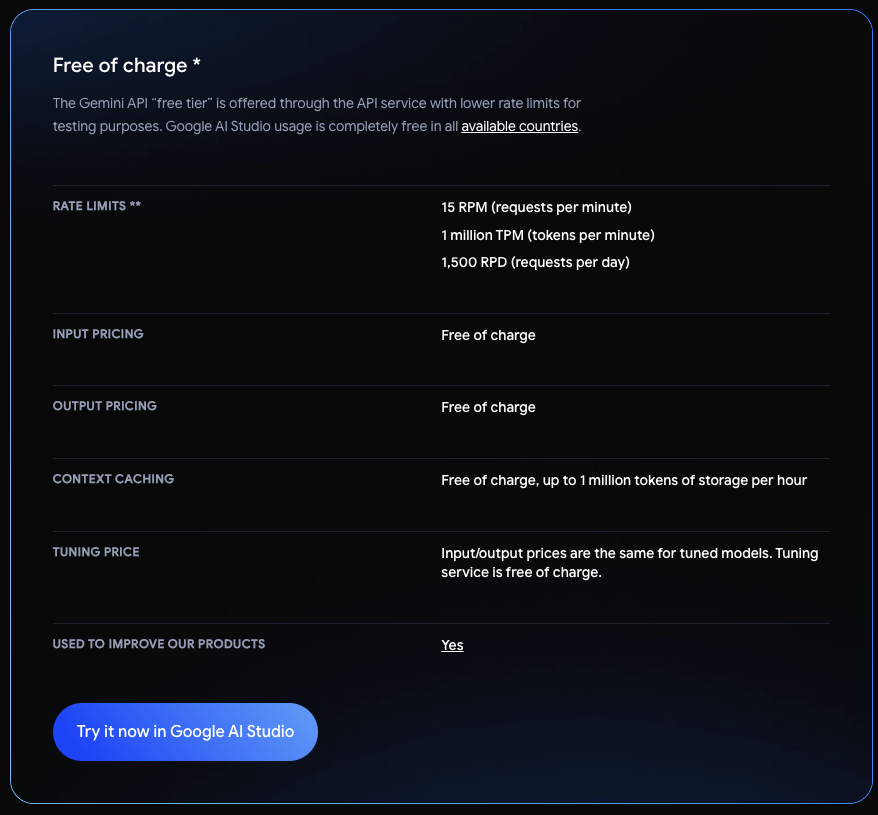
As you can see, that’s more than enough to start playing around with the API, so there’s really no excuse not to integrate it into our projects.
Their Quick Start guide is super straightforward.
In my case, I’m using Gemini for a pretty pointless task, but the goal is to show just how easy it is to integrate their API.
Check out the following snippet, which generates “funny quotes” based on a popularity number.
const { GoogleGenerativeAI } = require("@google/generative-ai");
const genAI = new GoogleGenerativeAI(process.env.GEMINI_API_KEY);
const model = genAI.getGenerativeModel({ model: "gemini-1.5-flash" });
const popularity = 42;
const prompt = `Write a funny quote, under 200 characters, about popularity on a scale from 0 to 100, where 0 is the least popular and 100 is the most. The quote should describe someone at ${popularity}.`;
const result = await model.generateContent(prompt);
console.log(result);
Output:
He’s a solid 42 on the popularity scale. Not quite ‘cool,’ but definitely not ‘that guy nobody talks to.’
That’s it! A couple of things to note:
- Notice how an
API_KEYenvironment variable is required. You can grab this from AI Studio once your account is set up. - The model selected is
gemini-1.5-flash. Studio AI offers multiple models, so you can experiment with different ones to find the best fit. - The rest is just regular JavaScript, passing a prompt to the
generateContentmethod and logging the result.
Demo
In my previous post, TensorFlow: From Python to JavaScript, I shared a demo that predicts the popularity of a Twitter account. Feel free to check it out, and if you click “Tweet my result” it’ll generate a tweet using the snippet above.
-
UI:
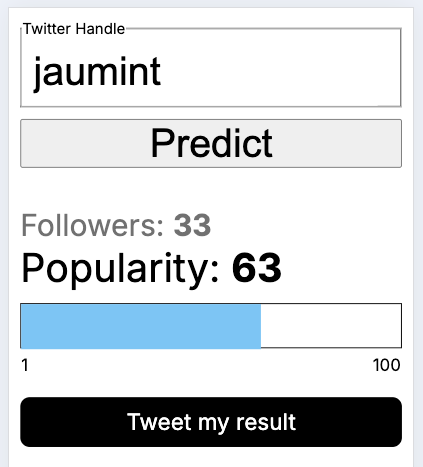
-
Tweet:
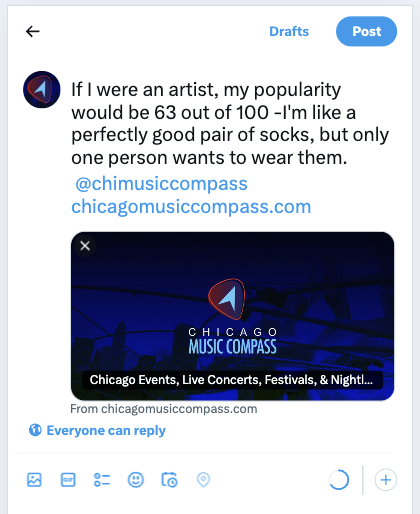
You can find the source code here
Get Code Feature in Studio AI
Additionally, Google offers Studio AI, which is similar to ChatGPT but with an interesting feature: Get Code. You can enter a prompt, and if it’s what you want for your service, just click the button, and it gives you the code you need to run the same prompt from your own code.
- Command:
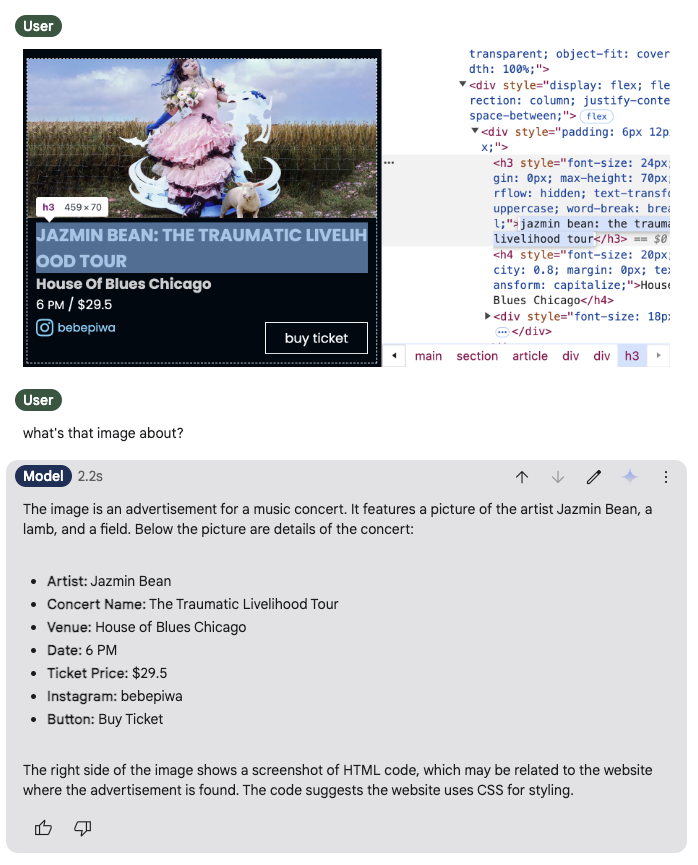
- Get Code:
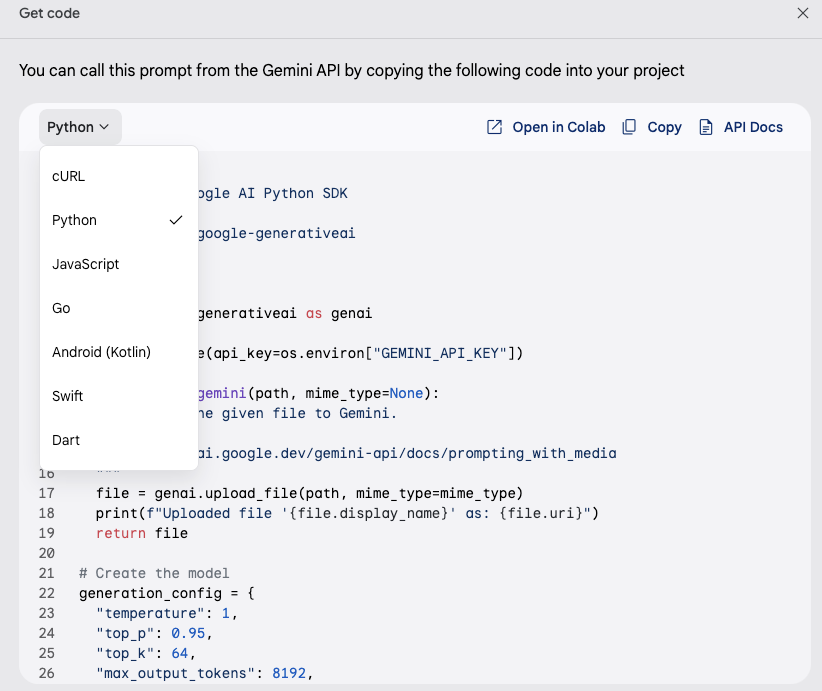
Choosing Between GPT and Gemini for Your Project
I’m a huge fan of ChatGPT, but as a developer, I’ve found Studio AI’s free tier super useful. For experimentation, OpenAI isn’t too expensive, but nothing beats a free tier. Both have solid documentation.
In my humble opinion, GPT still gives better answers than Gemini, but in the early stages of a project, I’d go with Gemini and switch to GPT when accuracy becomes critical and the investment makes sense.
In the meantime, I’d follow a proxy pattern, so if switching becomes necessary, it’s an easy task.
Let’s take a look at the following snippet:
const { GoogleGenerativeAI } = require("@google/generative-ai");
async function getJokeFromGenerativeAI() {
const genAI = new GoogleGenerativeAI(process.env.GEMINI_API_KEY);
const model = genAI.getGenerativeModel({ model: "gemini-1.5-flash" });
const popularity = 42;
const prompt = `Write a funny quote, under 200 characters, about popularity on a scale from 0 to 100, where 0 is the least popular and 100 is the most. The quote should describe someone at ${popularity}.`;
const result = await model.generateContent(prompt);
return result;
}
// proxy
async function getJoke() {
const joke = await getJokeFromGenerativeAI();
return joke;
}
This way, consumers can call getJoke() without worrying about what’s happening under the hood. As time passes, and let’s say GPT is needed, the change becomes simple:
const OpenAI = require("openai");
async function getJokeFromOpenAI() {
const openai = new OpenAI();
const popularity = 42;
const prompt = `Write a funny quote, under 200 characters, about popularity on a scale from 0 to 100, where 0 is the least popular and 100 is the most. The quote should describe someone at ${popularity}.`;
const completion = await openai.chat.completions.create({
model: "gpt-4o",
messages: [{ role: "user", content: prompt }],
});
return completion.choices[0].message;
}
// proxy
async function getJoke() {
const joke = await getJokeFromOpenAI();
return joke;
}
Notice how getJoke now calls the new method: getJokeFromOpenAI. Since both methods follow the same contract—they both return a Promise that resolves into a string—the consumers of getJoke won’t notice the change and don’t need to update anything.
Conclusion
Every day, more applications are integrating AI, to the point where users are starting to expect it, just like they expect fast and user-friendly websites. As a developer, it’s important to know the options out there: Custom Model, Open Source Model, and Private Model, and leverage them to our advantage. Who knows what’s next, but whatever it is, it will definitely be built on the shoulders of AI.